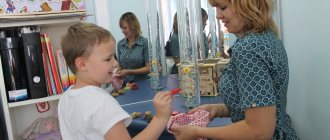Children's speech therapist services
Speech therapy classes for children from 2 years old are conducted by appointment individually and in small groups. The duration of the lesson is from 30 to 45 minutes. Parents' presence at the lesson is required.
Call:
Write:
Working hours
from 9.00 to 20.00 daily without days off or breaks.
Parents often ask themselves questions:
- Does my child speak well?
- Why are all the children around already chatting, but mine can’t put together two words?
- When should you contact a speech therapist if your child has a lisp, burr...?
- What to do if there is a lot of drool in the child’s mouth or the tongue deviates to the right (left)?
- Is it stuttering or not?
- Should we wait five years, as the children's speech therapist at the clinic says, or not waste precious time?
The education system in Russia now makes it extremely difficult for a child to receive a free consultation with a speech therapist. The number of speech therapists in kindergartens has sharply decreased, and the quality of speech therapy assistance has deteriorated significantly. There are no or almost no speech therapy gardens. In kindergarten and school, a speech therapist can work with you only after your child has passed a special commission confirming that the child needs speech therapy help. Not all diagnoses are considered by the commission as necessary for classes with a free speech therapist. And the classes, if they finally get around to it, will last 10-15 minutes and give minimal results.
This does not mean that a speech therapist in kindergarten is a bad speech therapist. This means that a speech therapist working in a government institution is now faced with a colossal number of students from one cluster in need of speech therapy help. A speech therapist is physically unable to fully help your child.
General education institutions mean a complete lack of work with parents. You will not know what your child is doing during the lesson, no one will inform you at what stage your production of sounds is and whether there is any result at all. And if you are diagnosed with “Dysarthria,” you are unlikely to be sent to a neurologist and will not receive a speech therapy massage. And if they do, they will not explain that “Dysarthria” is an insidious thing and without the intervention of parents and the ability to help the child in time, the diagnosis of “Dysarthria” will return at the first stress. As a rule, all work with parents in kindergartens comes down to homework in a notebook on the weekends. Indifference reigns both in gardens and in clinics.
Speech therapists in Moscow
Who is a speech therapist?
Speech problems occur in almost every child. Many babies are unable to make specific sounds. Most often, these problems disappear as they grow older, but the help of a specialist in eliminating such phenomena is still necessary. It is the speech therapist who deals with the correction of such disorders.
What does a specialist do?
The task of a speech therapist is not only to teach the child to say “tiger” instead of “tigl”, but also to understand the causes of the problem that has arisen. If the disorder occurs due to some serious illness, then the help of a doctor may also be required. Often, a speech therapist helps a child prepare for school and learn to interact with society. Poor speech can cause a child to develop serious psychological complexes, so it is imperative to visit a specialist.
A speech therapist works not only with children. It helps restore normal speech to adults as well. Similar problems often occur after head injuries or strokes. Competent interaction between the attending physician and the speech therapist allows a person who has suffered from the disease to minimize the consequences and, if possible, regain normal ability to speak. Sometimes completely healthy adults, for whom speech defects may prevent them from building a career (for example, politicians), resort to the services of a speech therapist.
When should you contact a professional?
It is simply impossible not to notice speech problems in your baby. Some of them can be eliminated at home. However, not all parents have sufficient knowledge and the right amount of time. And even if these important factors are present, it is not always possible to solve the problem. Therefore, speech defects need to be eliminated as early as possible. Speech therapists work both in regular clinics and in private institutions, as well as kindergartens. In educational institutions, specialists themselves check children and, if necessary, can recommend parents to undergo a course of treatment.
How to become a speech therapist?
You can become a speech therapist at almost any pedagogical university. Medical education is not mandatory, but it is worth remembering that in your work you will inevitably have to meet with children suffering from some kind of deviation, so knowledge of the basics of defectology will be necessary. If a future speech therapist plans to work in a hospital, then he will need to understand the basics of neurology in order to understand the causes of the development of specific speech disorders.
To get a job as a speech therapist in Moscow, it is best to graduate from one of the leading universities, for example, Moscow State Pedagogical University or Moscow State Pedagogical University. There are specialized defectology faculties here, which have been training highly qualified specialists for many decades.
Famous Moscow specialists
The beginning of the development of speech therapy in Russia can be considered the first experiments in deaf pedagogy in the 17th century. It was then that scientists first realized the importance of correcting speech disorders. It took more than 200 years for speech therapy to become a separate discipline, and yet it was only in the 30s of the twentieth century that a truly serious attitude towards this area began to take shape. S.S. played a major role in the development of Russian speech therapy. Lyapidevsky. For a long time he worked at the Research Institute of Defectology, and then headed the department at Moscow State Pedagogical Institute. IN AND. Lenin. D.I. worked with him. Azbukin, Doctor of Science, academician. She taught at Moscow universities and L.S. Volkova, through whose efforts higher defectology education was actively developing.
What is the way out of this situation?
Go to a private speech therapy center with good reviews. Yes, it's paid. But reasonable prices for good service are normal. This is the health and future of your child. It is important. In a private center, you can attend lessons where the speech therapist is not only obliged, but also happy to share information with you about your child. Give new direction to your thoughts. Recommend a related specialist (for example, a speech pathologist or psychologist), whose help can enhance the effectiveness of speech therapy classes. The speech therapist will find an individual approach to your child and develop a speech correction program for him. Each lesson you will understand and know what your child is doing in the lesson, what his results are. In a private center, 45 minutes will be devoted only to your child and no one else. Home environment, smiling speech therapists, non-official premises, candy, tea, toys, books, no fear for the child, no stress for you. Comfort.
We have experienced speech therapists, as well as a neurologist and a neuropsychologist. We provide assistance to all children from 2 years old and older. We can handle any diagnosis. In conclusion, I can say that there are no “difficult” children, there are only unqualified specialists.
How to find a speech therapist for a child?
If you notice any problems with speech development in your baby, then they should be addressed immediately: children grow quickly and there is not as much time as it seems.
Speech development should be dealt with by a competent specialist who will find a common language with the child and can eliminate the defect in the shortest possible time. In this article we will tell you what to look for when choosing a speech therapist. At first glance, finding a speech therapist is not a problem: the Internet is full of advertisements, in addition, they can be seen in development centers and kindergartens. But how do you know that this specialist is right for your child?
Qualification
If you find a speech therapist through an advertisement, then the first thing you should make sure of is his qualifications and experience. Often the speech therapist himself offers to look at his diploma. It should say: “Teacher-defectologist, speech therapist,” of course, it would be better if full-time education is indicated. The university also matters. Practice shows that the best speech therapists are graduates of large pedagogical universities and institutes where there is a defectology department.
What is a good speech therapist for children?
Choosing a speech therapist for a child is an important process. However, how do you understand which speech therapist is good for children, and which one is better to avoid? There are several points to pay attention to.
Let’s say right away: the speech therapist’s place of work does not matter. A good specialist can be found both in a commercial clinic and in a regular one. This could be a private owner or an employee of a state kindergarten. The cost of an hour of his work does not matter either: many good speech therapists work “for the idea” and are happy about it. And even recommendations with reviews may not work, since another person may be suitable in your case. So what should you pay attention to when you urgently need a speech therapist for children?
Education. The first thing you need to find out from a specialist. A good speech therapist will proudly display his diploma and various certificates confirming his education and achievements. But if he refuses to show it, it’s not worth doing business with him. Such a speech therapist will never be good for a child. It's not worth even trying. A specialist without a specialized higher education can easily do harm, but is unlikely to help. It is the specialized higher education received full-time that is important. Unfortunately, now there is a tendency towards distance education. And if in some areas this is quite acceptable, then for speech therapy it is not. Only full-time higher education can guarantee that this is a real specialist - a speech therapist-defectologist who has studied all the intricacies of science for several years. Courses, especially correspondence courses, are powerless here. And if your interlocutor suddenly says that he is not a defectologist, but a highly specialized speech therapist, be wary. A person who does not have fundamental knowledge in speech therapy should not be allowed to see the child.
Attitude towards the child and parents. A good speech therapist for a child will be pleasant in communication with both the child and his parents. However, first of all, he tries to establish contact with children. Of course, it is with them that you will have to work, and you cannot do without complete mutual understanding. A specialist should not “little”, but treat with respect - this is a must.
Terms of cooperation. There are no standards. Therefore, even a good speech therapist will not be able to say exactly when he will lead the child to the desired result. However, he can and should tell you what he will do and what intermediate results are expected. He will tell you in detail about the working methodology and the possibility of changing it. You should be wary if a speech therapist promises to correct the situation in a couple of sessions - this is too self-confident. If it works out, great, but to promise and even guarantee is very presumptuous. It should also be confusing if a speech therapist says that years of hard work will be required and does not talk about intermediate goals and milestones.
First appointment time. A good speech therapist never sees children in a hurry, on the go. He will definitely pay maximum attention to get an idea of the existing problems. Then he will also slowly and thoroughly discuss the situation with his parents. If something is in doubt, he may recommend an examination or consultation with another specialist (ENT doctor, audiologist, neurologist) in order to be confident in the correctness of his judgment and help the child faster.
Features of the work. Where and how does a speech therapist meet? Group lessons or individual? A good speech therapist will create the most comfortable conditions for children and will invite parents to classes without fail. This way, moms and dads have the opportunity to see what exercises their kids are doing, remember them (and even write them down) to practice at home. This way the result is achieved faster. If a speech therapist avoids contact with parents in every possible way, speaks verbosely, but without specifics, it is unlikely that he belongs to the category of knowledgeable and experienced.
Justification of the need for each type of activity. A good speech therapist not only keeps in touch with parents, but also justifies every step he takes. Why this particular technique was chosen, what results will be achieved, what will happen next. He is not afraid of questions. Answers them in detail and clearly. Talks about alternative methods and why they are good or bad.
Hometasks. A qualified speech therapist must come up with a variety of homework assignments for children to complete at home. And he asks parents for their implementation, insisting on the importance. Indeed, the simplest directed games and reading books can speed up the process, and a good specialist will definitely take advantage of this.
A good speech therapist for children:
- studied at a specialized university and has a specialist diploma: speech therapist-defectologist;
- has certificates and certificates of completion of advanced training courses, which he takes regularly;
- a pleasant person to talk to, gets along well with the child and treats parents with respect;
- substantiates his point of view, knows how to explain to parents “on fingers” what the baby’s problem is and how best to solve it;
- talks carefully about the timing of cooperation, preferring variable planning;
- allows and even welcomes the presence of parents in classes;
- gives homework and monitors its completion.
Need a speech therapist for your child? Sign up for a consultation by phone or through the feedback form in the “Contacts” section.
When to contact a speech therapist: check according to age standards
Dear parents, we offer you a simple and convenient speech therapy calendar that will tell you in what cases and at what age you need to show your baby to a speech therapist.
1 year
You need to contact him if the baby does not hum and babble, he does not utter repeated syllables like “bababa”, “mama”, etc., does not follow a moving toy with his eyes. This is already a reason for a serious examination not only from a speech therapist, but also from neurologist and otolaryngologist.
2 years
If the vocabulary size is 10 words or less, the child does not even speak simple phrases, he is silent, uses gestures, if he has individual sounds, but it seems to you that he “understands everything.”
3 years
At this age, a visit to a speech therapist is mandatory, even if the child is developing within normal limits. Speech therapy help is urgently needed if the baby:
- confuses sounds, replaces one sound with another;
- speaks incomprehensibly, in “his” language;
- is silent, but understands the speech of adults;
- speaks much worse than peers;
- has a poor vocabulary, makes gross mistakes like “red doll”, etc.









